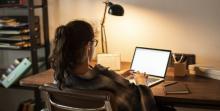The COVID-19 pandemic has disrupted almost all aspects of our lives, including the daily rhythm of the University of Washington's staff, faculty, and students. However, students in many of our remotely-taught Sociology classes have been using a sociological lens to better understand how COVID-19 is impacting our lives and our communities.
PhD student Erin Carll's original plan for Spring quarter was to to teach SOC 402, our Education Practicum, in which students gain first-hand knowledge of educational disparities through their experiences tutoring in local public schools. With schools closed for the remainder of the year, Erin pivoted and developed a research practicum course, “Sociological Research on Education During a Health Crisis,” so that our undergraduates could gain practical research skills while studying how families with K-12 children have experienced the transition to distance learning. The students fielded an online survey—offered in English, Spanish, and Mandarin—that will enable them to investigate whether experiences vary by race, ethnicity, socioeconomic status, gender, school level, and "ability."
Jessica Addington, an undergraduate sociology student enrolled in the course, says conducting this research has helped her reflect on her own experiences during the pandemic. “Taking a class that focuses on the current pandemic while we are in the middle of it is so important,” she said. "It increases awareness while allowing students like us to explore the implications that events like this have on our society. This class is allowing me to stay informed and educated in a time of immense uncertainty and change.”
PhD student Steve Karceski, at first intended to focus his research practicum on the employment experiences of college students in Washington state. Instead, the students are now collecting data about students’ housing conditions, access to technology, employment status, and views toward online learning.
Finally, Professor Julie Brines modified her spring seminar, “The New Inequality” to focus on social stratification in the wake of COVID-19. Students kept a pandemic journal in which they use insights from the sociology of inequality to track how equitably aid and other resources are being distributed to various groups in society. Through these journals and in Zoom-based discussions, students have discovered how the pandemic—and our responses to it—reveals and in many cases worsens existing inequalities in the US and across the globe.
Learning about the impact of the pandemic on people’s health, as well as on their economic, social, and psychological well-being, raises important questions about whether this tragic disruption of everyday life will ultimately result in the creation of a more level playing field for all of us. We know that many students who major in Sociology are deeply invested in making a positive impact on their communities, and we are confident that by offering them a chance to use their sociological imaginations to analyze the pandemic in real time, we are helping to lay the foundation for them to make a better future.
